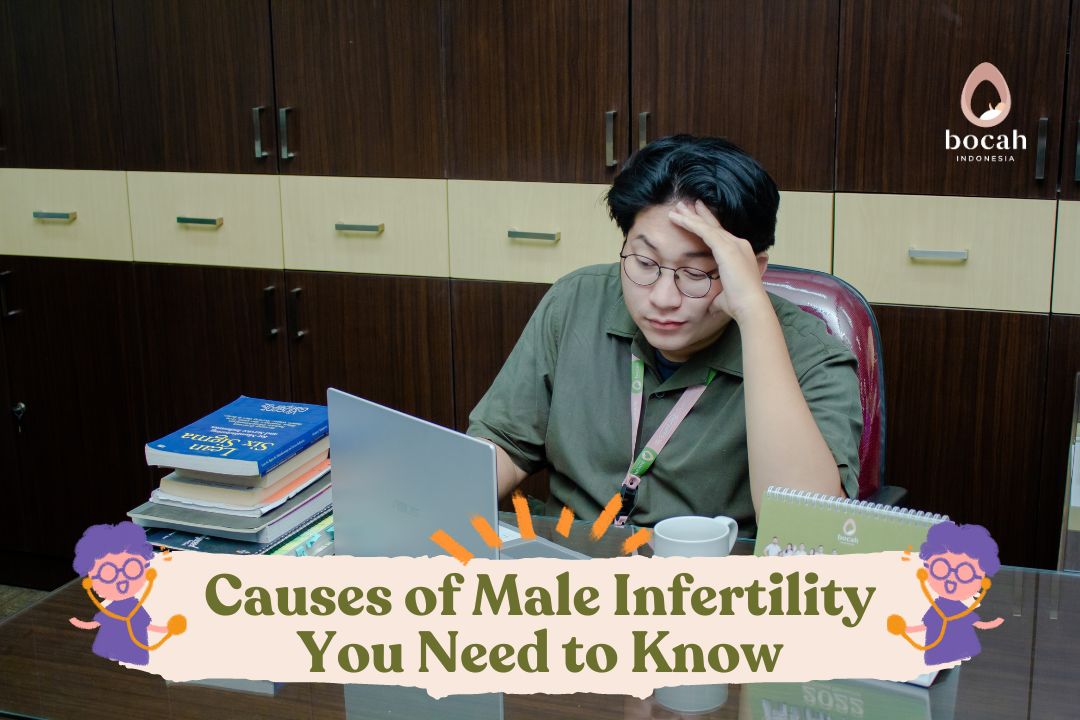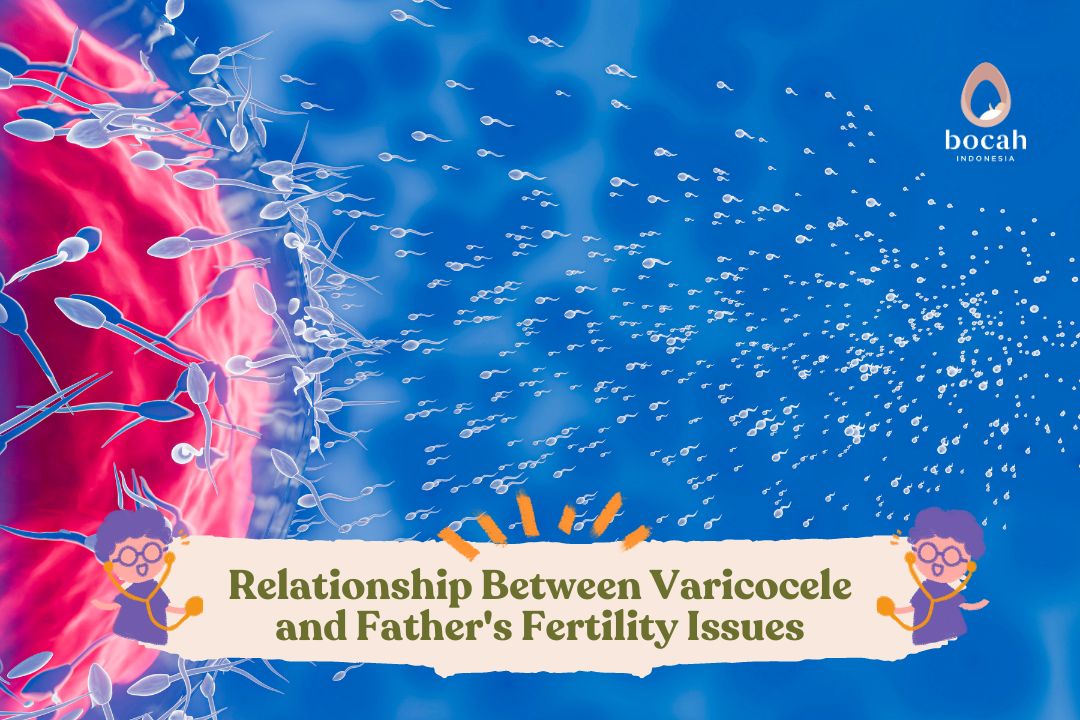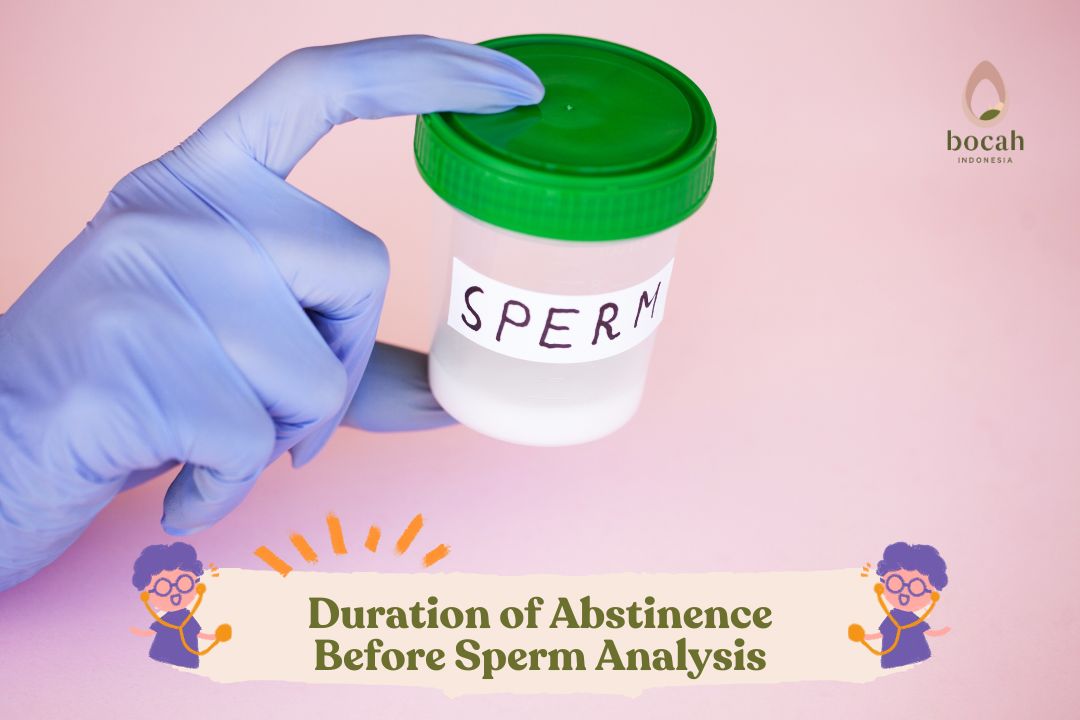Father Sterile, Feeling Down

To address infertility, it is important to identify its causes. Here are some causes of male infertility that need to be known.
Infertility in men is a condition where a man has difficulty impregnating a woman. This can be due to various issues within the male reproductive system that affect the production, movement, or function of sperm. One common cause of male infertility is low sperm count or poor sperm quality.
However, it’s important to note that infertility doesn’t always mean that a man will never be able to have children. In many cases, infertility issues can be addressed with medical treatments or reproductive procedures like artificial insemination or in vitro fertilization (IVF). Therefore, it’s important for fathers to find out what might be causing their infertility.
Causes of Male Infertility
Male fertility is a complex issue. Male fertility problems can stem from various health conditions or lifestyle factors. Here are some:
1. Varicocele
Varicocele is the swelling of blood vessels within the scrotum. It’s the most common cause of male infertility and can affect men of all ages. While the exact reasons varicocele leads to infertility are unclear, it may be related to abnormal blood flow. Varicocele reduces both sperm quantity and quality.
Tanya Mincah tentang Promil?
2. Infections
Certain infections can disrupt sperm production, sperm health, or cause scarring that blocks the passage of sperm. These include inflammation of the epididymis (epididymitis) or testes (orchitis), and some sexually transmitted infections such as gonorrhea or HIV. While some infections may lead to permanent testicular damage (as in the case of mumps), often sperm can still be retrieved.
3. Ejaculation Issues
Retrograde ejaculation is a condition where semen enters the bladder during orgasm instead of exiting the penis as it should. Various health conditions can cause retrograde ejaculation, including diabetes, spinal injuries, medications, and surgeries involving the bladder, prostate, or urethra.
4. Tumors
Cancer and benign tumors can directly affect male reproductive organs through hormone-producing glands related to reproduction, like the pituitary gland, or through unknown mechanisms. In some cases, surgeries, radiation, or chemotherapy used to treat tumors can affect male fertility.
5. Hormonal Imbalance
Infertility can result from disorders of the testes themselves or imbalances affecting other hormonal systems, including the hypothalamus, pituitary, thyroid, and adrenal glands. Low testosterone (male hypogonadism) and other hormonal problems have a variety of potential causes.
6. Sperm Duct Blockage
Multiple tubes carry sperm. They can become blocked due to various reasons, including unintended injuries from surgery, previous infections, trauma, or developmental abnormalities such as cystic fibrosis or similar inherited conditions.
Blockages can occur at different levels, including within the testes, the tubes that carry sperm, the epididymis, the vas deferens, near the ejaculatory ducts, or the urethra.
7. Chromosomal Abnormalities
Congenital abnormalities like Klinefelter syndrome—where males are born with two X and one Y chromosome (instead of one X and one Y)—can cause abnormal development of male reproductive organs. Other genetic syndromes related to infertility include cystic fibrosis and Kallmann syndrome.
8. Issues with Sexual Intercourse
This may involve difficulty achieving or maintaining an erection for sex (erectile dysfunction), premature ejaculation, painful intercourse, anatomical abnormalities like a urethral opening on the underside of the penis (hypospadias), or psychological or relational issues that interfere with sex.
9. Celiac Disease
Celiac disease is a digestive disorder triggered by sensitivity to gluten, a protein found in wheat. This condition can lead to male infertility. Fertility may improve after adopting a gluten-free diet.
10. Certain Medication Use
Testosterone replacement therapy, long-term anabolic steroid use, cancer drugs (chemotherapy), some acid reflux medications, some anti-inflammatory drugs, and certain other medications can disrupt sperm production and decrease male fertility.
11. Previous Surgeries
Certain surgeries can prevent you from ejaculating sperm, including vasectomy, scrotal or testicular surgeries, prostate surgery, and large abdominal surgeries performed for testicular and rectal cancer, among others.
Other Factors Affecting Male Infertility
Excessive exposure to certain environmental elements like heat, toxins, and chemicals can reduce sperm production or function. Specific causes include:
1. Industrial Chemicals
Prolonged contact with certain chemicals, pesticides, herbicides, organic solvents, and painting materials can lead to low sperm counts. Exposure to heavy metals like lead or other heavy metals can also cause infertility.
2. Radiation or X-rays
Radiation exposure can decrease sperm production, although it usually returns to normal. With high-dose radiation, sperm production can be permanently reduced.
3. High Temperature Exposure
High temperatures can disrupt sperm production and function. Although limited and inconclusive, regular sauna or hot tub use can temporarily decrease your sperm count.
Sitting for extended periods, wearing tight clothing, or working with a laptop on your lap for long periods can also increase scrotal temperature and slightly decrease sperm production. However, further research is needed.
4. Substance Abuse
Anabolic steroids used to enhance muscle strength and growth can lead to testicular shrinkage and reduced sperm production. For instance, the use of Schedule I drugs like cocaine or marijuana has been proven to decrease both the quantity and quality of your sperm by up to 55%.
5. Alcohol Consumption
Drinking alcohol can lower testosterone levels, cause erectile dysfunction, and reduce sperm production. Liver disease caused by excessive drinking can also lead to fertility problems.
6. Smoking Habit
Men who smoke frequently may have lower sperm counts than those who don’t smoke. Additionally, cigarette smoke can negatively affect male fertility, and in some cases, lead to impotence.
7. Obesity
Obesity can disrupt fertility in several ways, including directly impacting sperm and causing hormone changes that reduce male fertility.
These are some of the causes of male infertility. To determine whether a father is facing infertility issues or planning for pregnancy, it’s essential to consult a specialist in andrology. Proper treatment can help fathers and mothers conceive faster.
Source:
- Jornal Brasileiro de Reproducao Assistida. Diakses 2023. HIV, HPV and Chlamydia trachomatis: impacts on male fertility https://www.ncbi.nlm.nih.gov/pmc/articles/PMC7558888/
- Journal of Human Reproductive Sciences. Diakses 2023. Hyperprolactinemia: An often missed cause of male infertility https://www.ncbi.nlm.nih.gov/pmc/articles/PMC3205532/
- International Journal of General Medicine. Diakses 2023. Some of the Factors Involved in Male Infertility: A Prospective Review https://www.ncbi.nlm.nih.gov/pmc/articles/PMC7008178/
- Mayo Clinic. Diakses 2023. Infertility https://www.mayoclinic.org/diseases-conditions/infertility/symptoms-causes/syc-20354317






